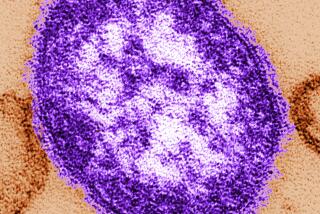Measles outbreak grows in L.A.’s Orthodox Jewish community despite California’s strict new vaccination law

A new California law requires children in both public and private schools to be vaccinated unless they have a medical waiver from a licensed doctor.
- Share via
Six months after California’s strict vaccine law took effect, a measles outbreak has infected 20 people, most of them in Los Angeles County, prompting a search for others who may have been exposed to the highly contagious virus.
Most of the patients live in western areas of the county, including L.A.’s Westside, the Santa Monica Mountains and the San Fernando Valley. Santa Barbara and Ventura counties each reported one case.
At least 15 of the 18 L.A. County patients either knew one another or had a clear social connection, said Dr. Jeffrey Gunzenhauser, interim health officer for the L.A. County Department of Public Health. None of the 18 could provide proof of vaccination, he said.
Gunzenhauser said the first person was diagnosed in early December, followed by 16 cases in the last three weeks of 2016, and then one more case last week.
“I’m hopeful that we’re getting to the end of this,” he said.
Hershy Z. Ten, a rabbi who runs Jewish healthcare foundation Bikur Cholim in L.A.’s Beverly Grove neighborhood, said county health officials told him a measles outbreak was affecting the county’s Orthodox Jewish community. He convened a panel last week to discuss steps that Jewish day schools and synagogues could take to stem the outbreak and ensure unvaccinated children are immunized.
“Measles is very, very serious,” he said. “Those children are at risk and they put other children at risk.”
A measles outbreak that began at Disneyland in 2014 infected 145 people across the United States, as well as dozens in Canada and Mexico. It led to the passage of a law in California requiring all children to be vaccinated unless a doctor provides a medical exemption. The law took effect in July.
California is now one of three states that forbid children from opting out of vaccines because of religious or personal beliefs.
Health experts say the outbreak reveals the degree to which immunity against the disease has eroded — a problem the new law will probably improve but not completely fix.
“It really speaks to what we’re so concerned about, which is parents making their decisions not to vaccinate their kids, and they can bring their kids into any setting and then contaminate everyone,” said Dr. Robert Adler, a pediatrician at Children’s Hospital Los Angeles.
Measles is one of the most contagious viruses in the world. If an infected person walks into a room, the virus can stay there for two hours after the person leaves, ready to infect someone. And it’s dangerous — 15 people die every hour worldwide from measles, according to the World Health Organization.
To try to stop the spread of the virus in Southern California, L.A. County health workers spent the last several weeks chasing down people who might have been exposed. Infected people develop a rash that can take weeks to show up, but they can transmit the virus to others before that.
Gunzenhauser said county health workers interviewed each infected person to find out everywhere they went during the four days before and after they developed a rash.
Then they tried to figure out who might have been at those locations. If someone went to an emergency room, for instance, they asked the hospital for a list of patients there that day.
The county ultimately identified more than 2,000 people who may have come into contact with a measles patient, and discovered that about 10% of them hadn’t been vaccinated against the disease. Half of those who weren’t protected were given a vaccination or other treatment to prevent them from getting measles, he said.
Gunzenhauser said the outbreak was contained to a group of people who shared a social circle, which made it easier to track down who might have come into contact with the virus.
“It is a little bit unusual, but it’s fortunate,” he said. “If this is a Disneyland thing or if this happened at Staples Center … that would be problematic for us.”
However, that doesn’t mean people in other parts of the county are safe from the highly contagious virus, he said.
“Measles just isn’t that way,” he said. “They could’ve driven and let’s say they stopped at a gas station — somebody could’ve gotten exposed.”
Though the state’s new law, known as SB 277, makes vaccinations mandatory, schools are only required to check children’s immunization statuses when they hit kindergarten or seventh grade. That means that a child who went unvaccinated upon entering kindergarten in fall 2015 because his parents opted out could have continued in first grade this past fall — still without vaccines.
“It was sort of a phase-in, so by the time over the next seven years, six years, we will eventually get to a point where every child is required [to be vaccinated], but it’s going to take some time for us to get there,” said Sen. Richard Pan (D-Sacramento), a physician who wrote the legislation. “It won’t happen right away.”
Children are supposed to receive two vaccines to protect against measles before they start kindergarten.
A bigger concern, Pan said, are the thousands of Californians who’ve already finished their schooling and never received immunizations. The UC system has said it will require vaccines for all new enrollees, but most young adults won’t encounter another vaccination checkpoint once they leave high school.
“You have critical masses of people who never got caught up on their immunizations,” Pan said. “We’ve been accumulating an ever-growing number … and that becomes the basis and source of outbreaks.”
That fear appears to be borne out in the most recent cluster of measles cases. Of the 18 cases in L.A. County, the biggest share were people in their 20s, though ages ranged from young children to older adults, Gunzenhauser said.
Adler, with Children’s Hospital, said some parents don’t vaccinate their kids because they believe they’ll be protected by herd immunity — the idea that if a certain percentage of people are vaccinated everyone will be safe from illness. But measles is so contagious that between 96% and 99% of people need to be immunized to establish herd immunity.
The state Health Department reported that in the 2015-16 school year, 94.5% of kindergartners had been vaccinated against measles.
“There are kids who’ve only had the one vaccine or none,” Adler said. “It’s pretty disturbing.”
soumya.karlamangla@latimes.com
Twitter: @skarlamangla
MORE LOCAL NEWS
Thieves steal hundreds of beehives primed to pollinate Central Valley almonds
First child death from flu reported this season in California as cases rise sharply
Downtown L.A. businesses try outreach to find permanent housing for the homeless
More to Read
Sign up for Essential California
The most important California stories and recommendations in your inbox every morning.
You may occasionally receive promotional content from the Los Angeles Times.











